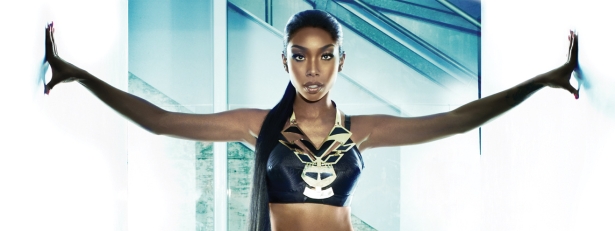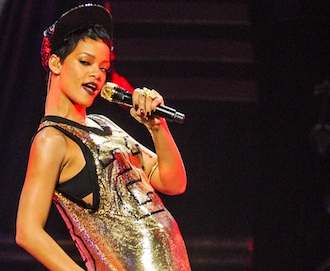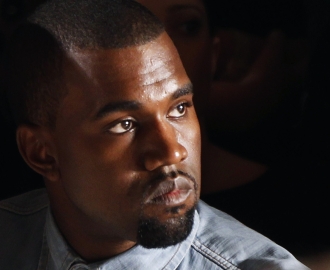Brandy and the Sad Fate of Pop Stars Who Take a Chance and Then Retreat
Her latest album bears the hallmarks of an artist who took a bold left turn but then returned to radio-chasing complacency—only to find that radio didn't really want her anymore.

A pop star is as much a brand as a performer. Mariah or Beyoncé or Rihanna: Their names are reduced to iconic single-word slogans for a reason. Yes, Madonna can change her look over and over as long as she's still the same sex symbol, and Robyn can shift over a step or two to move from teen dance sensation to serious dance sensation. But the core remains the surface, and that surface remains success. If you're selling, everybody's willing to shrug and let you pretend to be a genius if you want. But if your audience leaves you—well, you're not jazz or indie or alt country, are you? In pop, being a genius critic's darling isn't going to save you.
Thus the sad fate of Brandy. She's currently pushing a generic new album Two Eleven, out this week. But there was a moment back there, not too long ago, where it seemed like she was going to be an auteur. Weary of being just the most impressive effect in longtime producer Rodney Jerkins bag of tricks, Brandy ditched him. She turned instead to the equally hot but significantly quirkier Timbaland and his protégé Walter Millsap III. The result was Afrodisiac, the best album of Brandy's career and one of the greatest R&B albums of the last 25 years.
Afrodisiac is that rare album in which a pop star kicks her brand to the curb. Instead of default ballad after default ballad, Timbaland and Milsap provided a series of stuttering, burping productions in which Brandy's vocals swerved and bounced like velvet superballs. On "Sadiddy," Timbaland put hand claps and synths together to create a beat that sounded like a skipping chicken, which Brandy punctuated with rhythmic swinging vocals both declaiming and demonstrating that she ain't no bourgie sadiddy loser. On "Focus" Timbaland threw on a plangent electric guitar and a throbbing background while Brandy lightened her singing and emphasized her breathing to create a shimmering lament for a love she can't forget. The song was as much dream-pop as R&B—the kind of track that fuses two genres so seamlessly you wonder why anyone ever bothers to separate them in the first place.
It's certainly possible to see Afrodisiac as Timbaland's triumph rather than Brandy's; you could argue it's just an example of a different producer inserting a different program into the empty vessel. But the album didn't give the impression that its singer was taking orders. On the contrary, it came across as a conversation or a flirtation. On "Who Is She 2 U," Timbaland opened with his own beatbox vocals, which then served as a blueprint for the beat, so that the song became a kind of duet, with Brandy chewing out her man and Timbaland offering wordless evasions and/or encouragement. On "Afrodisiac," on the other hand, Brandy herself did the beginning rhythmic Timbalandesque quasi-beatboxing. Essentially he was mimicking her mimicking him. "You fulfill my every desire/when I'm with you, you take me higher/you're my Afrodisiac," she sang, and it sounded like a love letter from her to him and from him to her as they spiraled up into a rapturously, goofily stylish quintessence of funk.
MORE ON MUSIC
The last track of Afrodisiac is titled "Should I Go." It wasn't about leaving a lover, but about leaving the industry. Brandy mused that the music biz had changed since she started out, noted that she didn't need the money anymore, and wondered whether she should just chuck it all. "Should I go/should I stay/I'm in control either way" she declared as a piano figure looped earnestly. The self-dramatization, not to mention self-absorption, was off-putting—but, especially in the context of the album, it was hard not to appreciate the sentiment. Brandy was in a position to control her own career, and so she took a chance and made an idiosyncratic, daring album. Having done so, she should have been freer than ever. Why not follow up on those dream-pop hints on "Focus"? Or do more work with Cee-lo, whose boiling, rock-tinged "Necessary" sounds like nothing else on the album, or in Brandy's oeuvre? Once she'd gone from collaborating with Jerkins to Timbaland, why not from Timbaland to, say, Björk? What was to stop her?
The answer, alas, is that no one needed to stop her; she was perfectly capable of stopping herself. Afrodisiac performed disappointingly compared to her earlier albums. It did receive moderate critical praise and has gotten shout outs from folks like Rihanna and Beyonce—but you don't make a mark as a pop star by pleasing critics or by being an artist's artist. Brandy may have said she was in control, but that was just a front. She wants hits, and when you want hits, you don't have a career so much as your career has you. So she went back to Jerkins for her 2008 album Human... which, unfortunately, didn't do so great either.
So now Brandy's back with Two Eleven, her first album in four years. Jerkins is gone again, but instead of viewing that as an opportunity, she's simply enlisted Sean Garrett, Bangladesh, and a potpourri of other writers and producers to make the new boss sound just like the old boss. The singer's rich, burred, shamelessly multi-tracked alto slides over empty-headed lyrics and mid-tempo grooves just like it's 1998.
You could make distinctions if you really wanted to—personally, I'd say this set of songs is worse than the largely ignored Human, but better than the beloved-yet-boring 2002 Full Moon. But such parsing seems mostly beside the point. If you're one of the dwindling number of fans of this '90s style, you know what you're getting; if not you'll probably skip it anyway.
Even the slightly uncharacteristic club-bumper "Put It Down" seems overdetermined in its pandering to the zeitgeist. If Brandy's a pop star, she needs hits—so she gets by-the-numbers production by Bangladesh and hires Chris Brown to sing a verse, because that's what you do when you're chasing the brass ring. The result doesn't show breadth and vision so much as it underlines the extent to which there's no vision operating. Brandy, who thought for a second there about being an artist, has returned to being a cog.
What's most depressing is that her return to formula hasn't even mattered that much in terms of sales. The singer's '90s moment has passed; she's never going to matter the way she did back in the day. "Put It Down" has gotten to No. 3 on the R&B charts ... but that mostly demonstrates that Chris Brown is (inexplicably but nevertheless) very popular, not that Brandy is. Her followup, "Wildest Dreams," sans guest stars, has gotten nowhere near the top 10.
It's nice to think that Brandy would have been better off to follow the less-traveled path she gestured towards in Afrodisiac, but that may be overly optimistic. The truth is that contemporary R&B doesn't have any mechanism whereby radio divas can leverage critical cred to turn themselves into indie darlings the way, for example, country star Ricky Skaggs turned himself into a bluegrass performer once upon a time. Brandy tried something different, and the public didn't care, and so she was stuck. The fact that she's back doing the same thing as ever and the public still doesn't care much is just a final, pallid irony—a reminder that sometimes you don't have much choice but to sell your soul even if, or maybe especially if, no one is that interested in buying.




